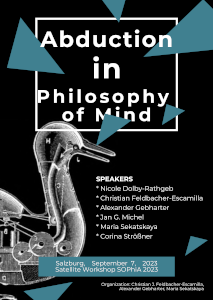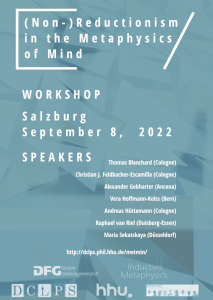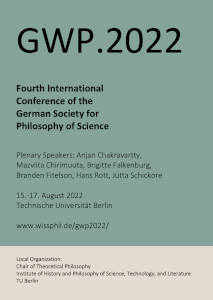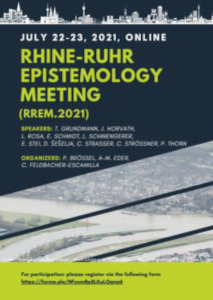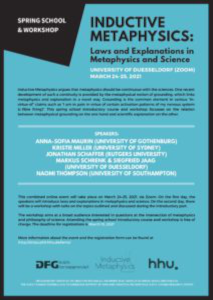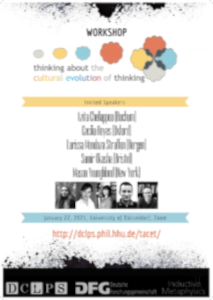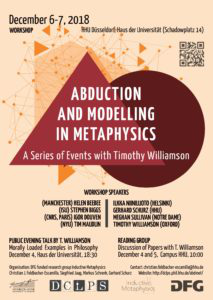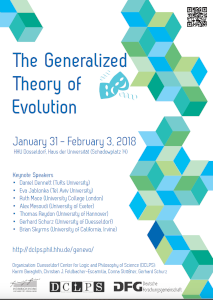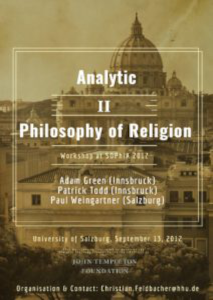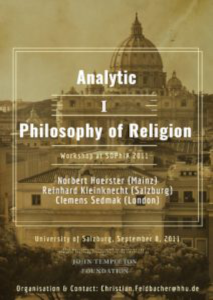Workshop: Similarity after Carnap. Perspectives from Philosophy and Cognitive Science
(organised together with Matias Osta-Vélez, Nina Poth, Annika Schuster, Corina Strößner)
AbstractThis workshop aims to bring together scholars from both philosophical and psychological traditions to debate the role of similarity in constituting categorization, analogical reasoning, and belief systems—and to explore the continuing relevance of Carnap’s work in this debate.
Details:
- Date: September 12-13, 2025
- Venue: University of Duesseldorf
- Invited Speakers (13): Javier Belastegui (Basque Country, Leioa), Caterina del Sordo (Basque Country, Leioa), Karin Enflo (Umeå), Christian J. Feldbacher-Escamilla (Cologne), Ulrike Hahn (Birkbeck, London), Thomas Mormann (Tsukuba), Matías Osta-Vélez (Duesseldorf), Nina Poth (Radboud, Nijmegen), Benjamin Santos Genta (Irvine), Luigi Scorzato (Genève), Corina Strößner (Greifswald), Steven Verheyen (Rotterdam), Daniel Weger (Frankfurt)
- Participants (#): about 20
Conference: GAP.12
(organised together with Elke Brendel, and Markus Schrenk)
AbstractDetails:
- Date: September 8-11, 2025
- Venue: University of Duesseldorf
- Invited Speakers (4): Quill R Kukla (Georgetown), Erasmus Mayr (Erlangen), Hannes Leitgeb (LMU Munich), Gillian Russell (Australian National University)
- Participants (#): about 500
Workshop: Abduction in Philosophy of Mind
(organised together with Alexander Gebharter, and Maria Sekatskaya)
AbstractDetails:
- Date: September 7, 2023
- Venue: University of Salzburg
- Invited Speakers (6): Nicole Dolby-Rathgeb (Zürich), Christian J. Feldbacher-Escamilla (Cologne), Alexander Gebharter (Ancona), Jan G. Michel (Düsseldorf), Maria Sekatskaya (Düsseldorf), and Corina Strößner (Bochum)
- Participants (#): about 20
Workshop: (Non-)Reductionism in the Metaphysics of Mind
(organised together with Alexander Gebharter, and Maria Sekatskaya)
AbstractDetails:
- Date: September 8, 2022
- Venue: University of Salzburg
- Invited Speakers (7): Thomas Blanchard (Cologne), Christian J. Feldbacher-Escamilla (Cologne), Alexander Gebharter (Ancona), Vera Hoffmann-Kolss (Bern), Andreas Hüttemann (Cologne), Raphael van Riel (Duisburg-Essen), and Maria Sekatskaya (Düsseldorf)
- Participants (#): about 20
- Web: http://dclps.phil.hhu.de/metmin/
Conference: GWP.2022
(PC: Member of the programme committee)
AbstractDetails:
- Date: August 15–17, 2022
- Venue: TU Berlin
- Invited Speakers (6): Anjan Chakravartty (Miami), Mazviita Chirimuuta (Edinburgh), Brigitte Falkenburg (Dortmund/Berlin), Branden Fitelson (Northeastern/Boston), Hans Rott (Regensburg), Jutta Schickore (IU Bloomington)
- Participants (#): about 150
- Conference Report in KRITERION – Journal of Philosophy
- Web: http://gwp2022.wissphil.de/
Workshop: New Work on Induction and Abduction
(organised together with Oliver R. Scholz, Gerhard Schurz, Ansgar Seide, and Maria Sekatskaya)
AbstractDetails:
- Date: September 29–30, 2021
- Venue: University of Düsseldorf (Online)
- Invited Speakers (12): Atocha Aliseda Llera (Mexico City), Alexandros Apostolidis (Athens), Stephen Biggs (Iowa), Elke Brendel (Bonn), Adam Carter (Glasgow), Igor Douven (Paris), Ilkka Niiniluoto (Helsinki), John Norton (Pittsburgh), Stathis Psillos (Athens), Chrysovalantis Stergiou (Athens), Paul Thorn (Duesseldorf), Jessica Wilson (Toronto)
- Participants (#): about 50
- Workshop Report in The Reasoner
- Web: http://dclps.phil.hhu.de/inab/
Workshop: RREM.2021: Rhine-Ruhr Epistemology Meeting 2021
(organised together with Peter Brössel, and Anna-Maria Eder)
AbstractDetails:
- Date: July 22–23, 2021
- Venue: University of Cologne (Online)
- Speakers (10): Thomas Grundmann (Cologne), Joachim Horvath (Bochum), Luis Rosa (Cologne), Eva Schmidt (Dortmund), Lukas Schwengerer (Duisburg-Essen), Dunja Šešelja (Eindhoven), Erik Stei (Utrecht and Bonn), Christian Straßer (Bochum), Corina Strößner (Bochum), Paul Thorn (Düsseldorf)
- Participants (#): about 20
- Web: http://dclps.phil.hhu.de/rrepistemology/rrem2021/
Summer School: Laws and Explanations in Metaphysics and Science
(Summer school and Workshop organised together with Siegfried Jaag, Markus Schrenk, and Maria Sekatskaya)
AbstractIn philosophy of science, scientific, i.e., causal and nomological explanation has long been the focus of reflection.
This spring school focusses on the relation between metaphysical grounding on the one hand and scientific explanation on the other.
In particular, we want to ask questions such as what the characteristic features of these two notions of explanation are, whether grounding explanations in metaphysics can play an analogous role to causal or nomological explanations in the sciences, and whether metaphysical grounding and scientific explanations can be treated in a unified framework.
Details:
- Date: March 24–26, 2021
- Venue: University of Düsseldorf (Online)
- Instructors/Speakers (4): Anna-Sofia Maurin (Gothenburg), Kristie Miller (Sydney), Jonathan Schaffer (Rutgers), Naomi Thompson (Southampton)
- Participants (#): about 80
- Web: http://dclps.phil.hhu.de/lems/
Workshop: Thinking About the Cultural Evolution of Thinking
(Workshop organised together with Karim Baraghith)
AbstractBoth share a Darwinian explanatory framework at their core, involving variation, selection, and reproduction/transmission. However, biological and cultural evolution differ in many important aspects and precise mechanisms – and many of these differences originate in the fact that we face ‘thinkers’ and more or less rational agents in cultural evolution. For example, cultural selection is subject to a whole range of ‘biases’ that have no analogue in biological evolution and are mostly grounded in cognitive capacities of the cultural agents.
While it is the aim of the special sciences to empirically explore this vast field of possible links between culture and thinking, social learning and cognition, it is the aim of philosophy of science to conceptually structure and represent this growing body of research. This workshop aims at bringing together scholars of both fields to inspire dialogue and future collaborations.
Details:
- Date: January 22, 2021
- Venue: University of Düsseldorf (Online)
- Invited Speakers (5): Azita Chellappoo (Bochum), Cecilia Heyes (Oxford), Larissa Mendoza Straffon (Bergen), Samir Okasha (Bristol), Mason Youngblood (New York)
- Participants (#): about 100
- Web: http://dclps.phil.hhu.de/tacet/
Summer School: Philosophical Engineering
(Summer school organiser)
AbstractDetails:
- Date: August 25–31, 2019
- Venue: University of Düsseldorf
- Instructors (6): Eckhart Arnold (Munich), Elke Brendel (Bonn), Filippo Ferrari (Bonn), Simon Huttegger (Irvine), Corina Strößner (Düsseldorf), Leander Vignero (Leuven)
- Participants (#): about 35
- Web: http://dclps.phil.hhu.de/engineering/
Conference: GWP.2019
(PC: Member of the programme committee)
AbstractDetails:
- Date: February 25–27, 2019
- Venue: University of Cologne
- Keynote Speakers (6): Martin Carrier (Bielefeld), Kärin Nickelsen (Munich), Erik J. Olsson (Lund), Michael Strevens (NYU), C. Kenneth Waters (Calgary), Katherine Hawley (St. Andrews)
- Participants (#): about 150
- Conference Report in KRITERION – Journal of Philosophy
- Web: http://gwp2019.wissphil.de
Workshop: The Possibility of Metaphysics. Between Inductive, Analytic, and Transcendental Arguments
(Workshop organised together with Kristina Engelhard, and Alexander Gebharter)
AbstractDetails:
- Date: January 31–February 1, 2019
- Venue: University of Düsseldorf
- Invited Speakers (8): Sophie Allen (Keele), Matti Eklund (Uppsala), Brigitte Falkenburg (Dortmund), Cord Friebe (Siegen), Gabriele Gava (Frankfurt), Thomas Hofweber (North Carolina), Holger Lyre (Magdeburg), Barbara Vetter (FU Berlin)
- Participants (#): about 20
- Workshop Report in Metaphysica
- Web: http://dclps.phil.hhu.de/possmet/
Workshop: Abduction and Modelling in Metaphysics
(Workshop organised together with Siegfried Jaag, Markus Schrenk, and Gerhard Schurz)
AbstractDetails:
- Date: December 6–7, 2018
- Venue: University of Düsseldorf
- Invited Speakers (7): Helen Beebee (Manchester), Stephen Biggs (Iowa), Igor Douven (CNRS, Paris), Tim Maudlin (NYU), Ilkka Niiniluoto (Helsinki), Meghan Sullivan (Notre Dame), Timothy Williamson (Oxford)
- Participants (#): about 35
- Workshop Report in The Reasoner
- Web: http://dclps.phil.hhu.de/abdmet/
Workshop: Belief Aggregation and Epistemic Diversity in Science
(Workshop organised together with Gerhard Schurz)
AbstractDetails:
- Date: September 18, 2018
- Venue: GAP.10, University of Cologne
- Invited Speakers and Commentators (5): Christian List (LSE, UK), Stephan Hartmann (MCMP, Munich), Jan-Willem Romeijn (Groningen), Vlasta Sikimic (Belgrade), Corina Strößner (Düsseldorf)
- Participants (#): about 25
Conference: The Generalized Theory of Evolution
(Conference organised together with Karim Baraghith, Gerhard Schurz, and Corina Strößner)
AbstractThe generalization of the theory of evolution has not only had emphatic supporters, but has also been sharply critizised. In either case, various interesting questions can be raised within the framework. Is a Darwinian theory of cultural evolution a proper candidate to synthesize the social sciences? What is the surplus value of evolutionary explanations? More specifically, e.g., can language, meaning and content be explained in terms of evolutionary signaling games of coordination? Which facets of biological evolutionary systems can be applied to cultural evolutionary systems and where do they differ in relevant aspects? For example, are there any, and if, what is the methodological and ontological status of replicators in the cultural realm?
The conference aimed to gather answers to some of these frequently raised questions and explored recent attempts to move beyond mere qualitative theorizing in the domain of generalized evolutionary systems. By bringing together researchers with a common interest but with different backgrounds and toolboxes, we inspired interdisciplinary discussions and new collaborations.
Details:
- Date: January 31–February 3, 2018
- Venue: University of Düsseldorf
- Keynote Speakers (6): Daniel Dennett (Tufts), Eva Jablonka (Tel Aviv), Ruth Mace (UCL, London), Alex Mesoudi (Exeter), Thomas Reydon (Hannover), Brian Skyrms (Irvine)
- Participants (#): about 70
- Proceedings: https://www.jstor.org/stable/e48505833
- Conference Report in Kriterion – Journal of Philosophy, The Reasoner, and Journal for General Philosophy of Science
- Web: http://dclps.phil.hhu.de/genevo/
Conference: GWP.2016
(PC+LOC: Member of the programme committee and the local organising committee)
AbstractDetails:
- Date: March 8–11, 2016
- Venue: University of Düsseldorf
- Keynote Speakers (6): Rainer Hegselmann (Bayreuth), Paul Hoyningen-Huene (Hannover), Michela Massimi (Edinburgh), Stathis Psillos (Athens), Alexander Rosenberg (Duke), Gila Sher (San Diego)
- Participants (#): about 165
- Proceedings: https://link.springer.com/journal/10838/48/3
- Conference Report in Journal for General Philosophy of Science
- Web: http://gwp2016.wissphil.de
Conference: EPSA15
(LOC: Member of the local organising committee)
AbstractThe conference featured contributed papers and symposia covering all subfields of the philosophy of science and bring together a large number of philosophers of science from Europe and overseas. We are also welcoming philosophically minded scientists, e.g. as participants in a symposium.
Details:
- Date: September 23–26, 2015
- Venue: University of Düsseldorf
- Keynote Speakers (3): Cristina Bicchieri (Pennsylvania), Igor Douven (CNRS, Paris), Marcel Weber (Geneva)
- Participants (#): about 300
- Proceedings: https://doi.org/10.1007/978-3-319-53730-6
- Conference Report in The Reasoner
- Web: http://www.philsci.eu/epsa15
Workshop: Risk Assessment and Values in Science
(Workshop organiser)
Abstract* … to provide a historical and systematic overview of the value-neutrality and value-ladenness problem,
* … to relate the results to concrete constraints of risk assessment, and
* … to apply the latter results to intensively discussed decisions under risk in areas of public interest as, e.g., climate-, food- and geosciences as well as medicine.
Details:
- Date: September 2, 2015
- Venue: University of Salzburg
- Invited Speakers (5): Alexander Christian (Düsseldorf), Giovanna Cultrera (Rome), Wolfgang Kneifel (Vienna), Gerhard Schurz (Düsseldorf), Charlotte Werndl (Salzburg)
- Participants (#): about 20
- Web: http://dclps.phil.hhu.de/risk/
Workshop: Social Epistemology and Joint Action in Science
(Workshop organiser)
AbstractDetails:
- Date: September 4, 2014
- Venue: University of Salzburg
- Invited Speakers (4): Peter Brössel (Bochum), Anna-Maria Eder (Konstanz), Cédric Paternotte (MCMP, Munich), Paul Thorn (Düsseldorf)
- Participants (#): about 25
Workshop: Analytic Philosophy of Religion II
(Workshop organiser)
AbstractDetails:
- Date: September 13, 2012
- Venue: University of Salzburg
- Invited Speakers (3): Adam Green (Innsbruck), Patrick Todd (Innsbruck), Paul Weingartner (Salzburg)
- Participants (#): about 25
Workshop: Analytic Philosophy of Religion I
(Workshop organiser)
AbstractDetails:
- Date: September 8, 2011
- Venue: University of Salzburg
- Invited Speakers (3): Norbert Hoerster (Mainz), Reinhard Kleinknecht (Salzburg), Clemes Sedmak (London)
- Participants (#): about 25
Conferences: SOPhiA 2010–2022
(PC+LOC: Member of the programme committee and the local organising committee)
AbstractBy combining (ii) and (iii) we want to demonstrate, in contrast to some voices which claim that Analytic Philosophy constrains our intellectual life, that all traditional topics can be advantageously examined in the framework of Analytic Philosophy. It is our utmost concern to unite analytic philosophers from all around the world (cf. (i)). This is also in the sense of Carnap, who claims in his early work The Logical Structure of the World:
The new type of philosophy has arisen in close contact with the work of the special sciences, especially mathematics and physics. Consequently they have taken the strict and responsible orientation of the scientific investigator as their guideline for philosophical work, while the attitude of the traditional philosopher is more like that of a poet. This new attitude not only changes the style of thinking but also the type of problem that is posed. The individual no longer undertakes to erect in one bold stroke an entire system of philosophy. Rather, each works at his special place within the one unified science.
Details:
- Date: September, 2010–2022
- Venue: University of Salzburg
- Keynote Speakers:
- SOPhiA 2022: Otávio Bueno (Miami), Bas van Fraassen (Princeton), Vera Hoffmann-Kolss (Bern), Leonhard Menges (Salzburg)
- SOPhiA 2021: Marian David (Graz), Herlinde Pauer-Studer (Vienna), Markus Schrenk (Düsseldorf)
- SOPhiA 2019: Hilary Greaves (Oxford), Philip Kitcher (Columbia), Hannes Leitgeb (MCMP, Munich)
- SOPhiA 2018: Elisa Aaltola (Turku), Helen Beebee (Manchester), Wolfgang Künne (Hamburg)
- SOPhiA 2017: Johannes Brandl (Salzburg), Christian List (LSE), Michela Massimi (Edinburgh), Stathis Psillos (Athens)
- SOPhiA 2016: Jeremy Butterfield (Cambridge), Dorothy Edgington (Oxford), Julien Murzi (Salzburg), Sylvia Wenmackers (Leuven)
- SOPhiA 2015: Christopher Gauker (Salzburg), Friederike Moltmann (CNRS, Paris), Sonja Smets (Amsterdam), Ulla Wessels (Saarland University)
- SOPhiA 2014: Elke Brendel (Bonn), Winfried Löffler (Innsbruck),
Jeanne Peijnenburg (Groningen), Benjamin Schnieder (Hamburg) - SOPhiA 2013: Catarina Dutilh-Novaes (Groningen), Ole T. Hjortland (MCMP, Munich), Simon M. Huttegger (Irvine), Martin Kusch (Vienna)
- SOPhiA 2012: Stephan Hartmann (Tilburg), Jeffrey Ketland (MCMP, Munich), Charlotte Werndl (LSE)
- SOPhiA 2011: Carlos Ulises Moulines (Munich), Hans Rott (Regensburg), Gerhard Schurz (Düsseldorf)
- SOPhiA 2010: Alexander Hieke (Salzburg), Hannes Leitgeb (MCMP, Munich), Edgar Morscher (Salzburg)
- Participants (#): about 120
- Conference Reports:
- SOPhiA 2022: in KRITERION – Journal of Philosophy
- SOPhiA 2021: in KRITERION – Journal of Philosophy
- SOPhiA 2019: in KRITERION – Journal of Philosophy
- SOPhiA 2018: in KRITERION – Journal of Philosophy and The Reasoner
- SOPhiA 2017: in KRITERION – Journal of Philosophy and The Reasoner
- SOPhiA 2016: in KRITERION – Journal of Philosophy
- SOPhiA 2011: in KRITERION – Journal of Philosophy
- Web: http://www.sophia-conference.org/
Workshop: Moderner Atheismus (New Atheism)
(Workshop organised together with Albert J.J. Anglberger, Stefan H. Gugerell, and Paul Weingartner)
AbstractDetails:
- Date: November 13–14, 2008
- Venue: University of Salzburg
- Invited Speakers (8): Wolfgang Achtner (Giessen), Johannes Czermak (Salzburg), Hans Jörg Fahr (Bonn), Ernst Peter Fischer (Konstanz), Armin Kreiner (Munich), Winfried Löffler (Innsbruck), Eduard Nieznanski (Warschau), Wolfgang Wickler (MPI Seewiesen)
- Participants (#): about 30
- Proceedings: https://doi.org/10.1515/9783110319736

